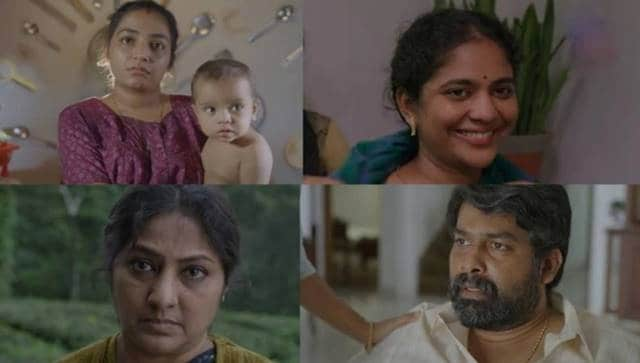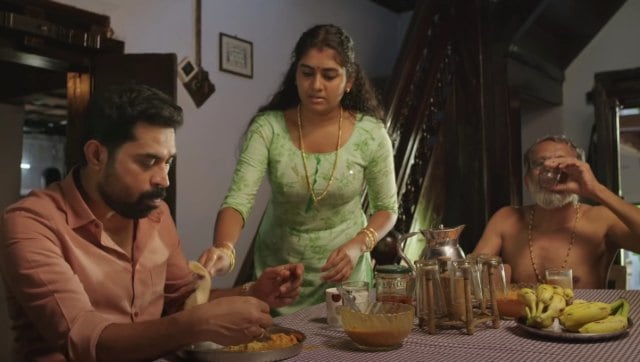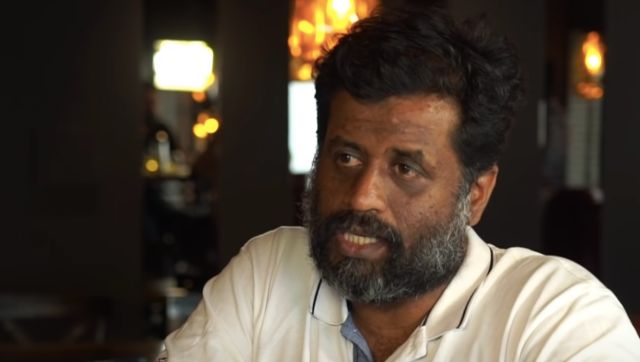Not even Jeo Baby would have envisaged the sheer magnitude and impact his film The Great Indian Kitchen would have on his audience when he made it. Women who have never written a single movie review on Facebook till then unleashed their creativity, bearing their souls, saying how much it hit close to home. Since it was released on OTT, the film reached out to a national audience, and not surprisingly women across languages shared their relief and gratitude for finally telling their stories. A year later, the film is still discussed and revered, and therefore it is no surprise that the same director’s latest release will be looked forward to with much interest. This time he is back with an anthology , featuring five stories that run on the common thread of freedom. We caught up with Jeo who isn’t averse to the idea of The Great Indian Kitchen part 2. How has life changed you after the Great Indian Kitchen? It was after I read the various writings of women on social media that I realised I had perhaps only addressed a lighter version of real life. They seem to be facing such issues everywhere on a daily basis. Single women finding it difficult to find a house, about postpartum depression. Her life is a never-ending narrative. Which means there are infinite possibilities to go for a second part of the film? Of course. But I need to fine-tune them, and I will definitely do a second part when I get time. Now you have a reputation to live up to. Has that also put you under pressure? Not really. This film I made for the anthology, for instance, isn’t a political film. It’s a family drama. I want my films to be progressive, but that doesn’t mean I want to be labelled as someone who only does a certain type of film. I want to experiment with genres. Maybe a fun film next.
Where did you find this story for the anthology? I would say it came from my home. My father’s name is also Baby George and he developed dementia at the age of 65. Though I was friends with him, I realised that it was not possible to treat a sick person the way they expect us to. I took care of him. But even then, there are a few constraints from our side that would always hurt them. We aren’t exactly kind when we treat older people. He developed a beautiful friendship with my mother-in-law and that was what was shown between Joju and Rohini. A lot of things that are shown transpired between them, including exchanging notes and snacks. I heard you thought of it soon after your second film, Kunju Daivam… Yes, I had told Joju about this film. But I didn’t think it had the potential to be a feature film. One fine day director Martin Prakkatt called me after The Great Indian Kitchen and wondered if I had a story for an anthology he was planning for Netflix. It was my wife who reminded me about this incident and Martin really liked the concept. But somehow things didn’t really work out. That’s when I decided to work on this. Except you, all are new directors here. How did you bring them all together? I told Jomon Jacob (who co-produced The Great Indian Kitchen) about an anthology in 2020. So the makers of the film were onboard. I was only focusing on the content and wanted a film better than mine. Francis Louis who edited the film came up with a story. Kunjila Mascillamani, Akhil, and Jithin Isaac are all people I met during the course of this film. Salu K Thomas, the cinematographer of TGK, told me about Kunjila who was his senior at the Sathyajith Ray Film and Television Institute. I was impressed by Jithin’s film which was screened at the IFFK and Akhil contacted me to pitch a story for Nee Stream which was used in this anthology. I told them to make a film they liked in 30 minutes and that it should also work for me. I didn’t stress on a particular genre or a common thread. I liked their content, but the
Freedom Fight
title came only after the first cut. [caption id=“attachment_10324391” align=“alignnone” width=“640”] Stills from Freedom Fight[/caption] How was the shooting process? I collaborated with the artists. We would transfer the funds and let them shoot the way they want without any interference from the production team. We only sent a team to Kunjila as there were practical difficulties in shooting at that location. Lali’s character seemed so familiar… That was my mom. It was after her retirement that she started doing the things she liked. So even those jackfruit chips and other classes were something I borrowed from her. Even now she is learning new things and doing certificate courses. Her freedom came after retirement. Her dialogues are what I have used in the film. Where do you stand on this debate on political correctness? I think the content should be politically correct. It’s all about whom we stand with towards the end of the film. Take a look at this Mammootty film Sagaram Sakshi, in which he practically abandons his wife and child owing to his own laxity, but the film empathises with him in the end. So many such narratives and they infuriate me. Are we trying to say that we should celebrate men irrespective of their karma? You can even make a politically correct film around a rapist, as long as we are not with him. We have hurt a lot of people in the name of comedy in films. But I think cinema has changed and I see a lot of progressive themes now. The Great Indian Kitchen was a theme that was happening every single day in a woman’s life for centuries. But it is only addressed now (KG George had a segment in Adaminte Variyellu in 1983) and ironically a man wrote it. Do you think maybe a woman didn’t write because she was living with that for so long that she didn’t think it was worth a story? Yes, I think it is because of their conditioning. These issues are not affecting them. I realised this because I am a man who wasn’t expected to work in a kitchen and yet I did and realised what a huge peril this was. I don’t think my wife would have thought of it the way I did because she has taken the baton of patriarchal conditioning from her mother. I did speak to a lot of women though. [caption id=“attachment_9213231” align=“alignnone” width=“640”]
Stills from Freedom Fight[/caption] How was the shooting process? I collaborated with the artists. We would transfer the funds and let them shoot the way they want without any interference from the production team. We only sent a team to Kunjila as there were practical difficulties in shooting at that location. Lali’s character seemed so familiar… That was my mom. It was after her retirement that she started doing the things she liked. So even those jackfruit chips and other classes were something I borrowed from her. Even now she is learning new things and doing certificate courses. Her freedom came after retirement. Her dialogues are what I have used in the film. Where do you stand on this debate on political correctness? I think the content should be politically correct. It’s all about whom we stand with towards the end of the film. Take a look at this Mammootty film Sagaram Sakshi, in which he practically abandons his wife and child owing to his own laxity, but the film empathises with him in the end. So many such narratives and they infuriate me. Are we trying to say that we should celebrate men irrespective of their karma? You can even make a politically correct film around a rapist, as long as we are not with him. We have hurt a lot of people in the name of comedy in films. But I think cinema has changed and I see a lot of progressive themes now. The Great Indian Kitchen was a theme that was happening every single day in a woman’s life for centuries. But it is only addressed now (KG George had a segment in Adaminte Variyellu in 1983) and ironically a man wrote it. Do you think maybe a woman didn’t write because she was living with that for so long that she didn’t think it was worth a story? Yes, I think it is because of their conditioning. These issues are not affecting them. I realised this because I am a man who wasn’t expected to work in a kitchen and yet I did and realised what a huge peril this was. I don’t think my wife would have thought of it the way I did because she has taken the baton of patriarchal conditioning from her mother. I did speak to a lot of women though. [caption id=“attachment_9213231” align=“alignnone” width=“640”] A still from The Great Indian Kitchen[/caption] What do you think is the most interesting change that is happening in Malayalam cinema? I think this year, Stardom has taken a back seat. We have had a lot of content-driven films like Jaaneman, Super Sharanya, Ajagajantharam, Saras, Nayattu, Bheemante Vazhi, etc., and OTT has helped to bring the attention of cine-goers from all over India to Malayalam cinema. We have a film that talks about a woman’s reproductive rights. What was there in the 80s is coming back. There might not be much change in form but there is a definite shift in content. You have always scripted your films. Will that change in the future? I am planning a film with a new writer. I am making films about stories I am familiar with. When a writer has a story about people, milieu, or situations I am familiar with I will make that film. Are you enjoying acting? I am. Honestly, I don’t know if I can do films all the time. So acting generates income. Acting is a very easy job if the character suits us. You can sit back and wait for your turn. There is no stress. Which part of filmmaking do you enjoy the most? Pre-production. I am not someone who will sit in one place and write a script. I just write the scene order. The rest of the dialogues will be on my mind. During the shoot, I keep changing the dialogues. I never work with a complete screenplay. I like to improvise. That pre-climax photo montage in TGIK came during the shoot. I often discuss stories with my wife and friends, record them on the phone and then work around them. I spoke to my wife a lot about The Old age home. How do you update yourself as a creative individual? My updating happens from social media. I follow so many feminist writers on Facebook and I love their writings. Their writings resulted in The Great Indian Kitchen. I also read books, watch films, talk to friends, and hold discussions with women in my family. When did you discover feminism? It is impossible not to be a feminist in today’s society. I think I learnt it from a small age. I was always upset that my sister had to live with restrictions and rules while I had none. Even watching a film at night with family took time as we had to wait for the women to finish their kitchen chores. I have always discussed feminism with my sister without knowing it. My first film Randu Penkuttikal is inspired by that. Neelima Menon has worked in the newspaper industry for more than a decade. She runs an exclusive Malayalam movie portal called fullpicture.in. She is known for her detailed and insightful features on misogyny, and the lack of representation of women in Malayalam cinema.
A still from The Great Indian Kitchen[/caption] What do you think is the most interesting change that is happening in Malayalam cinema? I think this year, Stardom has taken a back seat. We have had a lot of content-driven films like Jaaneman, Super Sharanya, Ajagajantharam, Saras, Nayattu, Bheemante Vazhi, etc., and OTT has helped to bring the attention of cine-goers from all over India to Malayalam cinema. We have a film that talks about a woman’s reproductive rights. What was there in the 80s is coming back. There might not be much change in form but there is a definite shift in content. You have always scripted your films. Will that change in the future? I am planning a film with a new writer. I am making films about stories I am familiar with. When a writer has a story about people, milieu, or situations I am familiar with I will make that film. Are you enjoying acting? I am. Honestly, I don’t know if I can do films all the time. So acting generates income. Acting is a very easy job if the character suits us. You can sit back and wait for your turn. There is no stress. Which part of filmmaking do you enjoy the most? Pre-production. I am not someone who will sit in one place and write a script. I just write the scene order. The rest of the dialogues will be on my mind. During the shoot, I keep changing the dialogues. I never work with a complete screenplay. I like to improvise. That pre-climax photo montage in TGIK came during the shoot. I often discuss stories with my wife and friends, record them on the phone and then work around them. I spoke to my wife a lot about The Old age home. How do you update yourself as a creative individual? My updating happens from social media. I follow so many feminist writers on Facebook and I love their writings. Their writings resulted in The Great Indian Kitchen. I also read books, watch films, talk to friends, and hold discussions with women in my family. When did you discover feminism? It is impossible not to be a feminist in today’s society. I think I learnt it from a small age. I was always upset that my sister had to live with restrictions and rules while I had none. Even watching a film at night with family took time as we had to wait for the women to finish their kitchen chores. I have always discussed feminism with my sister without knowing it. My first film Randu Penkuttikal is inspired by that. Neelima Menon has worked in the newspaper industry for more than a decade. She runs an exclusive Malayalam movie portal called fullpicture.in. She is known for her detailed and insightful features on misogyny, and the lack of representation of women in Malayalam cinema.
)